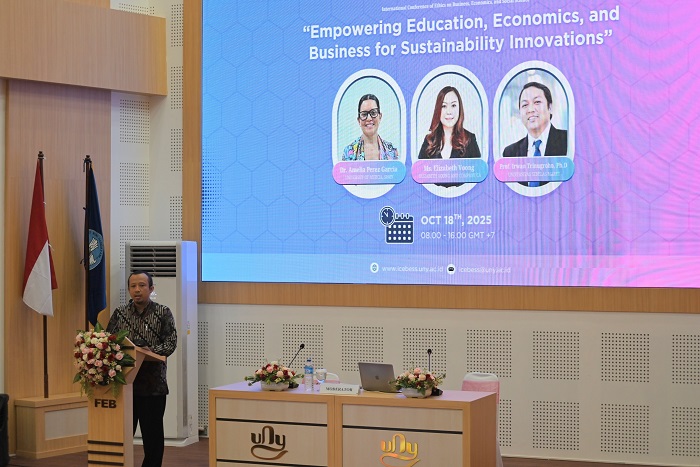You are here
ICEBESS 2025 Highlights Global Academic Collaboration for Sustainable Development

The 2025 International Conference on Ethics of Business, Economics, and Social Sciences (ICEBESS), organized by the Faculty of Economics and Business, Universitas Negeri Yogyakarta (FEB UNY), once again served as a global forum for academic dialogue. Held virtually via Zoom, the conference gathered more than 500 participants, including lecturers and students from various universities in Indonesia and abroad, to explore the intersection of ethics, economics, and sustainability.
ICEBESS 2025 featured three distinguished keynote speakers representing both academic and professional expertise: Ms. Elizabeth Voong from Elizabeth Voong and Company CA, Dr. Amelia Pérez García from the University of Murcia, Spain, and Prof. Irwan Trinugroho, Ph.D. from Universitas Sebelas Maret (UNS), Indonesia. In addition to the plenary session, the conference also hosted 53 papers presented in parallel sessions covering a wide range of topics, including economics, education, and management.
In his opening remarks, Dr. Sutirman, M.Pd., Dean of FEB UNY, expressed that ICEBESS serves as a vital platform for strengthening academic contributions to global challenges. Prof. Nur Hidayanto Pancoro Setyo Putro, M.Pd., Ph.D., Vice-Rector for Academic Affairs at UNY, also highlighted the importance of cross-disciplinary research and collaboration in achieving sustainable development.
The first keynote speaker, Ms. Elizabeth Voong, presented a session titled “Fraud Observation and Business Sustainability”, emphasizing the importance of ethical governance in maintaining business continuity. She pointed out that integrity-based corporate practices not only prevent financial loss but also build public trust. Data-driven approaches to fraud detection, she noted, are essential in fostering transparency and accountability in organizations.
Meanwhile, Dr. Amelia Pérez García delivered a presentation on “Sustainability as a Driver for Growth and Development”, discussing how education, technology, and innovative business models are becoming the key enablers of sustainable progress. Through four main pillars—human capital, social cohesion, economic prosperity, and environmental protection—she argued that sustainability should no longer be seen as a cost, but as a source of innovation, resilience, and competitiveness.
The final keynote, Prof. Irwan Trinugroho, Ph.D., explored the nexus between financial inclusion, digital technology, and economic growth. Drawing on data from 84 countries, he demonstrated that digital innovation significantly enhances financial access and drives economic expansion, especially in developing nations. He further emphasized that FinTech has the potential to create new employment opportunities and reduce unemployment when supported by adaptive labor market policies.
ICEBESS 2025 reaffirmed its relevance to the Sustainable Development Goals (SDGs), particularly Goal 8 (Decent Work and Economic Growth), Goal 9 (Industry, Innovation, and Infrastructure), and Goal 13 (Climate Action). By integrating education, technology, and ethical policymaking, the conference underscored academia’s essential role in advancing inclusive and sustainable development. (fdh)

Faculties, Graduate School, and Directorates
- Faculty of Education and Psychology
- Faculty of Engineering
- Faculty of Mathematics and Natural Sciences
- Faculty of Languages, Arts, and Cultures
- Faculty of Social Sciences, Law, and Political Science
- Faculty of Health and Sports Science
- Faculty of Vocational
- Graduate School
- Directorate of Quality Assurance
- Directorate of Researches and Community Services
Contact Us
Copyright © 2026,
